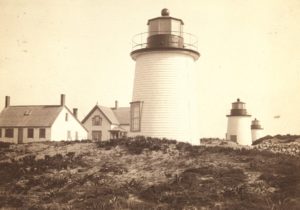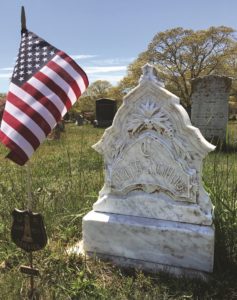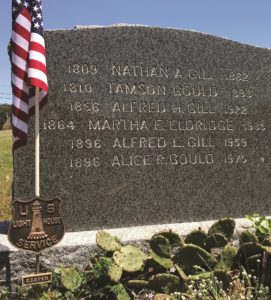EASTHAM — The offshore waters of Outer Cape Cod, with their hidden sand bars, took so many vessels and lives that the stretch from Chatham to Provincetown came to be known as the Graveyard of the Atlantic.
Less than a decade after the Lighthouse Establishment was founded in 1789 — the first federal agency responsible for construction and maintenance of lighthouses — Highland Light in Truro became Cape Cod’s first sentinel, keeping watch over the Peaked Hill Bars. A decade later, twin wooden towers were built at Chatham.

By the mid-1830s, the people of Eastham were imploring the Boston Marine Society — instrumental in sponsoring measures to improve navigation since its founding in 1742 — to consider an additional station at Nauset. On the recommendation of the Society, $10,000 was appropriated in March 1837 to build three round brick towers 15 feet tall. Nicknamed the “Three Sisters,” they were distinguishable by sailors from the one beacon at Truro and the two at Chatham. In time, one of Chatham’s twin replacement towers, built in 1877, was moved to Nauset, replacing the Sisters.
Nauset Light is Cape Cod’s most celebrated lighthouse, now cared for and doted over by the nonprofit, all-volunteer Nauset Light Preservation Society (nausetlight.org). Founded in 1993, the group’s original mission was to rescue the beacon from coastal erosion; in 1996, the light was successfully moved back from the brink. The Society has recently been researching and marking the graves of Nauset’s lighthouse keepers, six in Eastham’s Evergreen Cemetery and one in the Orleans Cemetery.
On May 15, members of the NLPS, the National Park Service, and Eastham Historical Society, as well as descendants of the Nauset keepers, gathered at Evergreen Cemetery to honor their memory and service. Graves had been marked with bronze U.S. Lighthouse Service medallions into which, during the ceremony, American flags were placed as those in attendance read the “Lighthouse Keepers Prayer” at each grave.
One of the keepers buried in Evergreen Cemetery, Benjamin H.A. Collins (1798-1878), was instrumental in advocating for a lighthouse at Nauset. Having witnessed dreadful loss of life and property, Collins went to Boston to meet with those who had interests in keeping seagoing traffic safe. In September 1837, the federal government purchased land from Collins to build the lighthouse.

Collins expected to be rewarded with the appointment as Nauset’s first keeper, a federal job then under the purview of the Treasury Dept. Politics played a prominent role in such appointments, and Collins was seen as a Whig (the predecessors of the Republicans) because he was from the staunchly Whig town of Eastham. He thought he had been passed over for the job by the administrations of President Martin Van Buren and Massachusetts Governor Marcus Morton, both Democrats.
In 1841, with a Whig president (William Henry Harrison) and governor (John Davis) in office, Collins hoped to be appointed, but he was again passed over in favor of Henry Horton, then Eastham’s Whig representative in the Mass. legislature. Horton, apparently, had an inside line on the impending vacancy and actively campaigned for the position.
One might think that the controversy that soon unfolded around Collins had been ripped from today’s headlines rather than having taken place 178 years ago. As presented to the public, it had all the makings of a political thriller — treachery, backroom dealmaking, influence peddling, pay-to-play schemes, character assassination — and for more than a year it played out in the press, with Democratic and Whig papers alternately vilifying Collins or defending his integrity. What could a poor Eastham farmer have possibly done, in the view of Whig newspapers, to be catapulted into the realm of infamy and denounced as a “wretch,” a “villain,” a “traitor” and an “unprincipled scoundrel”?
Campaigning in November 1842 to be Eastham’s representative in the state legislature, Collins, perceived as the Whig candidate, prevailed over another Whig and a Democrat. Anticipating that Collins would take his seat in the House and carry out the wishes of the party that elected him, the people of Eastham were indignant when the popular vote failed to produce a majority for any candidate in a three-way race for governor and Collins “defected” and cast what was reported to be the deciding vote to fill Senate vacancies with Democrats, thus leading to the Democratic majority that selected Marcus Morton as governor and denied re-election to the Whig John Davis, Eastham’s choice.
This “flagrant act of perfidy” created the “utmost surprise” among the people of Eastham, noted the influential Whig-aligned Boston Advertiser. A great mystery was said to hang over the transaction, the writer questioning “how this infamous conduct of Collins could be accounted for.” What seemed to be an explanation emerged later in 1843 when, with legislative business finished, Collins was appointed justice of the peace and keeper of the Nauset Light, the latter appointment coming from Democrat John Tyler’s secretary of the treasury.

Had Collins, in fact, sold out the state of Massachusetts to the Democrats, as one reporter averred, or had he “acted conscientiously in the discharge of duty,” as another claimed, not having been elected as a Whig, since townspeople were unaware of his politics, but as an independent, unpledged candidate whom the good citizens of Eastham chose because they had confidence in his integrity? And had Collins, in fact, been the deciding vote that elected Marcus Morton, or had that swing vote belonged to one Charles Bell, thereby casting shade on the so-called Collins bargain?
As competing newspapers spun and wove their versions of events, Benjamin H.A. Collins weathered the onslaught. One newspaper even noted that the partisan Whig attacks on Collins had become so vicious that some townspeople who had their suspicions about his motives ultimately came to his defense. He served as keeper during the Democratic Polk administration, after which he was succeeded by Joshua Crosby, appointed in April 1849 during the Whig administration of Zachary Taylor. Henry Y. Hatch was Nauset’s next keeper, serving during Millard Filmore’s Whig presidency, but in 1853, with the election of Democrat Franklin Pierce, Benjamin H.A. Collins was again appointed, serving until the outbreak of the Civil War, when his brother, Michael Collins, succeeded him.
Were politics at work in the appointment of Benjamin H.A. Collins? The intrigue certainly didn’t matter to ships’ masters, whose only concern was that the lamps were lit, safely guiding those at sea.



